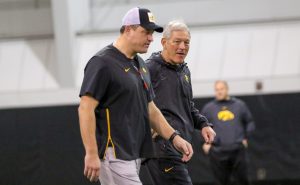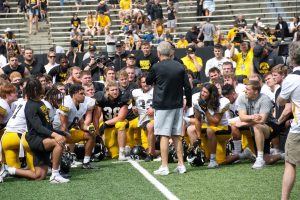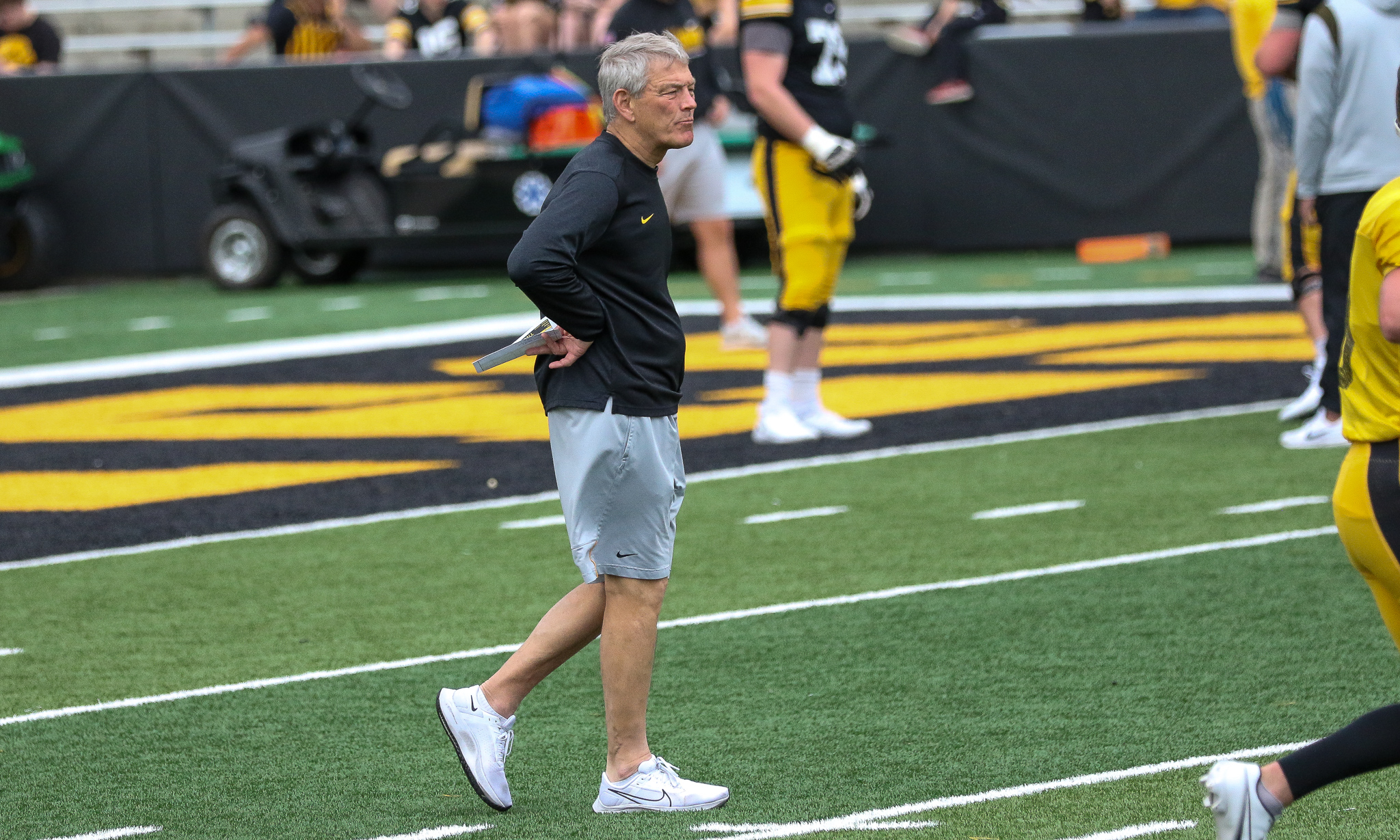Kirk Ferentz’s decision to move forward without advisory committee shouldn’t be perceived as just complacency
By Pat Harty
IOWA CITY, Iowa – Kirk Ferentz said on the final day of spring practice on April 23 that he would have a decision about the future of his diversity advisory committee in June.
It turns out he was right about the timing.
Ferentz told the Des Moines Register in a recent interview that he has no plans to continue or restructure the committee.
The committee was formed in 2020 after multiple former black players accused the Iowa football program of racial disparities.
Ferentz instead will work directly with Iowa’s Diversity, Equity and Inclusion staff, and Ferentz told the Register that this approach came at the recommendation of Lew Montgomery, who is the athletic department’s interim director of diversity, equity and inclusion, and a former Iowa fullback.
Ferentz said he plans to invite former players to spend time with the current team during the spring and summer so they can discuss topics related to race and other issues, but the meetings will be informal.
Ferentz’s handling of his advisory committee has been a polarizing issue for some fans, and for some in the media.

His supporters will say that Ferentz has taken the right steps since the accusations were made, that he has learned from the experience and that he already has paid a heavy price, including the dismissal of his long-time strength and conditioning coach and close friend, Chris Doyle, who reached a separation agreement with the university about two weeks after the accusations were made public.
Ferentz’s critics will say that he only took steps to address the alleged discrimination because he had no other choice from a public relations standpoint, and they will also say that getting rid of the committee is a mistake, because in this case, having more checks and balances is better when dealing with an issue as serious as racism.
Ferentz admitted to having a “blind spot” shortly after the accusations of racial disparities were made public in the summer of 2020.
It seemed to be his way of saying that he became too comfortable and too trusting of the people around him, namely Doyle, who had been Iowa’s strength coach since 1999.
Some will say that Doyle became Iowa’s scapegoat and sacrificial lamb to protect others, including Iowa offensive coordinator Brian Ferentz, who is Kirk Ferentz’s son and the focus of a discrimination lawsuit filed by seven former Iowa black players.
One thing is certain; time and results will ultimately determine if Kirk Ferentz has chosen the right approach to handling a very delicate issue.

It would be unfair and narrow-minded to say that Ferentz isn’t serious about fixing the Iowa culture just because he chose to dissolve the advisory committee.
Dissolving the committee might have sent the wrong message to some, but to automatically assume from his decision that Kirk Ferentz no longer considers fixing the culture a priority seems a bit presumptuous and short-sighted.
Whether you like how Ferentz has handled the racial issues or not, there are reasons to be encouraged.
Perhaps the biggest reason is the low number of black players that have entered the transfer portal over the past year.
Iowa lost four black players to the portal since the start of last season – receivers Tyrone Tracy Jr., Desmond Hutson and Quavon Matthews, and tight end Josiah Miamen.
But in each case, the desire for more playing time seemed to be the reason for leaving more than anything else.
More proof of progress came from a one-on-one interview with Iowa senior defensive back Kaevon Merriweather just days before the 2022 Citrus Bowl in Orlando, Florida.
Merriweather was adamant when saying the culture was getting better, and that proper steps were being taken to create a more inclusive environment.

A cynic might dismiss it by saying, ‘what else is he going to say publicly?’
But you had to be there to realize that Merriweather was giving more than just lip service, or a public relations answer.
He seemed to be speaking from the heart when he didn’t necessarily have to, and his words left a lasting impression.
One of the problems when addressing this topic is that if you defend Kirk Ferentz, some will automatically label you as a racist, or as an apologist.
But if you criticize or question Kirk Ferentz, some will automatically call you a hater or a race baiter with an agenda.
It would be silly to think that Kirk Ferentz doesn’t want what is best for Iowa football and for his players.
If Lew Montgomery truly believes that working internally is the best path moving forward, and that having an advisory committee is no longer necessary, then let’s give him and Liz Tovar a chance to execute their plan instead of just assuming that it won’t work, or that it’s a sign that Kirk Ferentz is getting complacent, or that Kirk Ferentz has too much power and influence.
Tovar is the Executive Officer and Associate Vice President of Diversity, Equity and Inclusion, and she is highly respected.
The question is how much power and influence will she have to execute the plan?
Again, the answers will come over time and with results.
This is a developing story whose conclusion is far from being written.



